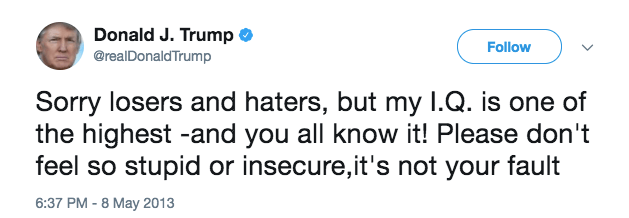
Internal conflicts are nothing new in politics, but they are usually a little more subtle than the President of the United States being called a “moron” by his own Secretary of State. Last week, Rex Tillerson is reported to have made that comment, and Trump responded with a challenge “to compare IQ tests.” What Trump may not know – and what most people don’t know – is that the IQ test is not the best measure of intelligence.
IQ stands for Intelligence Quotient. The first known IQ tests were developed by French psychologist Alfred Binet, who developed them as a standard, objective scale to identify which Parisian schoolchildren needed extra help at school. IQ testing arrived in the US a few decades later, when Henry Herbert Goddard brought Binet’s scale to the US, where he used it in a psychological study of “feeble-minded children.” In 1908, he published his own version of the scale, which, thanks in part to his own heavy promotion, soon became widespread in American schools and was even used in a court of law.
IQ Tests – A Scientifically Flawed Idea
But there are some serious problems, mostly around what IQ tests actually measure. Scientifically, we’ve come a long way and learned a lot more about how the brain works since IQ tests came into being in the early 1900s, and IQ tests don’t give a good overall picture of intelligence. There is a worrying tendency for people with more privilege – better education, more family income, better nutrition – to do better in IQ tests. As education becomes more widespread, IQ levels in all populations are rising – something called the Flynn Effect – which suggests IQ tests evaluate learned skills and not, as they claim, inherent intelligence.
So what’s wrong with the science?.
- The tests are too simple. The largest single study of human cognition – involving over 40,000 people – found that overall intelligence involves at least three separate brain pathways, and IQ tests don’t take that complexity into account. Albert Einstein (whose IQ has been estimated at 160 – normal range is 85 – 115!) famously stated “Everybody is a genius. But if you judge a fish by its ability to climb a tree, it will live its whole life believing that it is stupid.”
- Some psychologists argue – anecdotally, many of my teacher friends would agree – that a child’s behavior in class tells you far more about its ability than an abstract test. IQ tests can identify problems but not solutions – they can’t suggest interventions for kids with difficulties – which rather limits their practical use.
- The concept that intelligence is something we’re born with and can’t change, as opposed to something that develops in context (e.g. as we go to school, learn manual skills in a trade, etc) is problematic. If that were true, why would we ever go to school? The philosophy that IQ is innate conveniently ignores the fact that IQ scores traditionally correlate with income level, education level, nutrition level, and many other factors related to privilege. In other words, their narrow definition of “intelligence” measures the type of skills more likely to be picked up by society’s most privileged groups.
IQ Tests Are Occasionally Racist
Despite these scientific flaws, IQ tests have been widely used for decades. But the fact that they focus on such a narrow definition of intelligence makes them easy to misuse in order to “prove” mental inferiority, a concept that’s integral to racist philosophy.
- Eugenics, the problematic idea that the human race could be improved by selectively breeding “desirables,” made the rounds in the early twentieth century. The most infamous application of this horrendous idea was Hitler’s Nazi Germany, in which untermenschen (“under-people”) were shot, gassed, and generally wiped out. Goddard, the man who brought IQ testing to the United States in 1908, didn’t promote a Holocaust, but he was heavily invested in a similar philosophy; his most popular book argued that society should stop “feebleminded” people from having children, either by locking them away in institutions or forcibly sterilizing them.
- IQ has also been used to justify racism. In 1994, the now-infamous book The Bell Curve claimed that black people were innately of lower IQ than white people. In 2002, the father of the then Finnish prime minister published a book arguing that low national IQ is a cause of some countries having weaker economies (logically, it’s the inverse – because countries with weaker economies are less able to invest in education, it impacts national IQ). As recently as 2013, the co-author of an immigration study for the Heritage Foundation had claimed that the average IQ of immigrants “is substantially lower than that of the white native population”; subsequently, a scientist asked if research into IQ and race should be banned. His rationale was that IQ had been abused in this fashion too often, and there was a real risk of “stereotype threat” where minority children would start to under-perform due to the perception they were less capable.
- IQ has been used to attack economically disadvantaged people and the welfare state. The Bell Curve claimed that social welfare enabled women with low IQ to have babies, thereby “diluting the intelligence of the human race.”
So is there a better way?
- Some scientists have proposed that a minimum of 12 tests, including tests on focused attention, deductive reasoning, and verbal working memory, are necessary to give an overall picture of a person’s general intelligence.
- K-ABC (Kaufman Assessment Battery for Children) is a test that takes a broader view of intelligence than standard IQ tests, and is based on more solid neuropsychology (brain science) and statistics. It’s also more appropriate for testing amongst different ethnic groups.
- CAS tests are similarly based on neuropsychology, and more fairly assess children from different backgrounds. They go further than many other intelligence tests; in addition to identifying children with special educational needs, they can identify what interventions might best help these children to learn.
So, while traditional IQ tests may still be useful for identifying which children need extra learning supports, they should be used only as part of a much bigger evaluation program, which ideally gives more weight to teacher reports on how a child performs and behaves in class over a period of time than a single test. The traditional method from 1908 might be a fun way to pass the time on your phone during your daily commute – or insult a member of the Presidential cabinet – but don’t put a lot of stock in your results, because there are much better ways to assess intelligence in the 21st century.
 Naomi Elster has a PhD in breast cancer. She writes about science and an evidence-based approach to women’s issues. Both her nonfiction and fiction have been widely published, including by The Guardian, Howlround, and Mosaics, An Anthology of Independent Women. Twitter @Naomi_Elster
Naomi Elster has a PhD in breast cancer. She writes about science and an evidence-based approach to women’s issues. Both her nonfiction and fiction have been widely published, including by The Guardian, Howlround, and Mosaics, An Anthology of Independent Women. Twitter @Naomi_Elster


Grok Nation Comment Policy
We welcome thoughtful, grokky comments—keep your negativity and spam to yourself. Please read our Comment Policy before commenting.